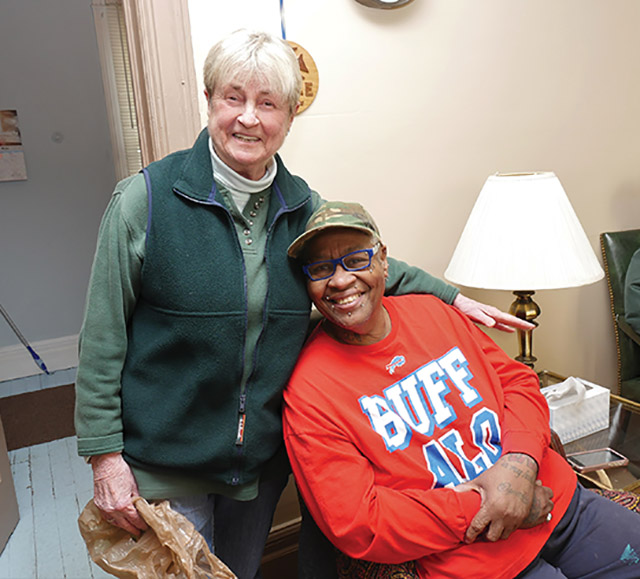The surprisingly positive Catholic view of sex and love

We don’t have one source of energy for sex and a totally separate one for the spiritual life. Our capacity for love is what drives all our deepest yearnings. (Photo: Hian Oliveira, Unsplash)
IT MAY SEEM counterintuitive for a nun to be writing about love and sex. I certainly don’t claim to be an expert. But anyone who has tried to live the celibate life with integrity for most of their adult life has had to face struggles for sexual maturity. We are challenged to understand the interface between desire, love, the need for intimacy, and our culture’s attitude toward the human body. To help us with these challenges is our knowledge of the Catholic Church’s stance on love and sex.
The general public assumption is that the church thinks sex is wrong and sees sexuality primarily as a problem rather than as a gift. This could not be more mistaken. If anything, the church takes sex much more seriously than the media or popular culture does. The church doesn’t see sexual relationships as a form of entertainment, a fashion statement, or an itch to casually scratch. The church only sees sexuality within the context of human and divine relationships, and in that sense, it affirms a very positive view of sex.
The Catechism of the Catholic Church says, “Sexuality is a source of joy and pleasure,” and in Vatican II’s Gaudium et spes, the church declared, “The actions within marriage by which the couple are united intimately and chastely are noble and worthy ones. Expressed in a manner which is truly human, these actions promote that mutual self-giving by which spouses enrich each other with a joyful and a ready will.”
What the church does warn against is acting on sexual drives that make us think about bodies—our own or those of others—in a disconnected and instrumental way. If we only focus on isolated parts of the human body as producing feelings and satisfaction, it’s as if there weren’t a whole person involved. This is where the difference between love and lust lies.
Saint Augustine might be called the patron saint of desire. He was the one, after all, who prayed, “Lord, give me chastity, but not yet.” Some have accused him of peddling a miserable, sex-hating version of Christianity, but in a famous sermon, he also said, “The whole life of a good Christian is holy desire. What you desire you cannot see yet. But the desire gives you the capacity, so that when it does happen that you see, you may be fulfilled … this is our life, to be exercised by desire.”
Augustine sees all true desire as rooted in God, who is the source of our entire human capacity to love, and the ultimate goal of all our loving. He sees any type of vicious desire as a toxic and self-destructive forgetfulness of our authentic goal and purpose, which is to mirror, in the way we love ourselves and others, the way in which God loves us.
We get diverted from what is best by perceiving and treating lesser things as goods, as commodities to be grasped, owned, and exploited for gratification alone. When we take things out of their proper context, they become destructive. A proper context here means that our sexual desire stays linked to genuine love and intimacy. God’s love is not opposed to eros (sexual love) but includes it.

We can share in this love by being both givers and takers. The seeker of sexual gratification for its own sake is a pure taker. In this sense, lust is opposed to love, including erotic love. In itself, eros is God’s gift to us. Grasping after the satisfactions of intimacy, amputated from its original goal, renders it sterile and meaningless.
Yes to a lust for life
A brilliant illustration of this can be found in the 2011 British film Shame, where the main character, Brandon, is a deeply unhappy sex addict. What comes across most forcefully in this bleak, powerful picture is the dreariness and banality of a life in thrall to lust. Endless repetition and variation of the sex act cannot bring him fulfillment. The core intimacy, the joy and the risk of mutual self-giving and receiving, are missing for him.
In the Spiritual Exercises, Saint Ignatius has a few things to say about desire. As Ignatius sees it, love leads to a lust for life, a delight and relish in the gifts and graces of God (which would include our sexuality and our capacity for intimacy) in which we fully rejoice. Ignatius encouraged people to live life with passion, and part of each exercise is to ask God for what we desire. Our problem, in his view, is not that we have too many desires but that we have too few, or at least that we often live at a low level of desiring that isn’t fully human.
The religious vow of chastity isn’t about suppressing desire in our life but channeling it toward the source and goal of all human desiring—God. For some people this deep connecting with our desiring selves will lead to falling in love with someone and wanting a committed and intimate relationship with them, and that is a holy and God-given vocation. For others God will be the beginning and ending of their deepest desires. In this sense, what religious life requires of us is to be people of passion.
Love is bigger than sex
Discussions about love often get monopolized by concentration on sexual love. While this is understandable, it isn’t the full story. Sexual love is one dimension, one expression, of the love that is meant to be at the heart of our lives. The key to a successful life is to love God through loving people.
When someone tells me they are considering becoming a religious, I think, do they have experience with loving and stable relationships? Are they open to loving and committed relationships with all kinds of people, including those in need? You need to have a very big heart to be a religious.
The truth is we need a big heart to be a Christian of any kind. We relate authentically to God only insofar as that relationship bears fruit in love of “the other.” Loving God carries within itself moral imperatives.
Both Saint Ignatius and Saint Francis of Assisi spent much of their young life fantasizing about romantic love. Saint Thérèse of Lisieux was brought up to be spoilt and self-seeking. For each of them, falling in love with God meant being set free to love in a deeper and wider way than they had ever dreamed of.
Faithfulness over the long haul
People yearn for intimacy. It’s part of being human. I have met many desperately lonely people who aren’t wanting for sexual partners. They have sex, but they don’t have the closeness of friendship or real intimacy. One way to honor our need for intimacy is to treat all of our relationships, romantic and non-romantic alike, as long-term ones. Living in a religious community has taught me the immense value of being faithful to friendships, including those I’ve had to work hard at. Knowing someone for many years, serving them daily in little ways and holding their hand as they are dying—that is true intimacy.
We don’t have one source of energy for sex and a totally separate one for the spiritual life. Our capacity for love is what drives all our deepest yearnings. As the Jesuit priest Pedro Arrupe wrote, “Nothing is more practical than finding God, than falling in love in a quite absolute, final way. What you are in love with, what seizes your imagination, will affect everything. It will decide what will get you out of bed in the morning, what you do with your evenings, how you spend your weekends, what you read, whom you know, what breaks your heart, and what amazes you with joy and gratitude. Fall in love, stay in love, and it will decide everything.”
A version of this article originally appeared in Vision 2016. Related article: VocationNetwork.org, “Does chastity matter?”
Tags
Related
- What Catholics believe about the Eucharist
- How Jesus embraced his call
- Prayer: Our never-ending conversation with God
- What the church is teaching—and learning—about the sin of racism
- Church defined: Jesus calls; we respond
- A Creed to believe in
- On whose authority?
- Ten great things about being Catholic
- Following Jesus: Be ready for some surprises
- Enter into the divine Read More
Most Viewed
- Find your spirituality type quiz
- FAQs: Frequently asked questions about vocations
- Celibacy quiz: Can you live a celibate life?
- Resources for older discerners or those with physical and developmental differences
- About Vocation Network and VISION Guide


